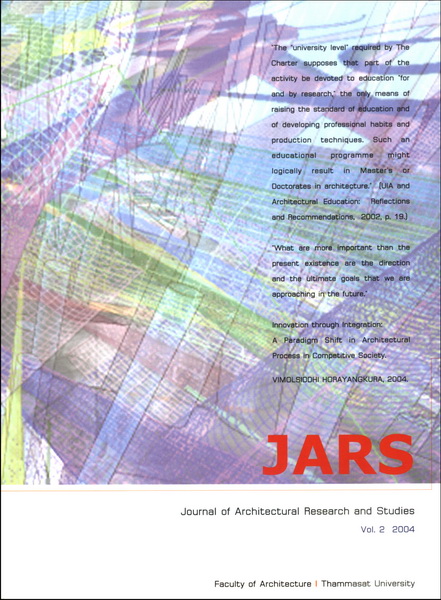Value System and Symbolic Architecture
Main Article Content
Abstract
This paper reviews how social values are manifested through architecture, the most obvious urban form in a city. Through global case studies with a focus on Bangkok, it argues that Bangkok’s architecture has lost grip on its own social values through Capitalism and Materialism. Being a symbolic of ‘pricing system’ instead of ‘value system’, many buildings have been shamelessly ‘commercially branded’ rather than ‘culturally branded’. At the end, some key solutions on how to retrieve a true value of which architecture should symbolise are put forward, focusing mainly on the significances of the real learning process in educational system and the genuine urban spirit of all urban architects.
Downloads
Article Details

This work is licensed under a Creative Commons Attribution-NonCommercial-NoDerivatives 4.0 International License.
All material is licensed under the terms of the Creative Commons Attribution 4.0 International (CC-BY-NC-ND 4.0) License, unless otherwise stated. As such, authors are free to share, copy, and redistribute the material in any medium or format. The authors must give appropriate credit, provide a link to the license, and indicate if changes were made. The authors may do so in any reasonable manner, but not in any way that suggests the licensor endorses you or your use. The authors may not use the material for commercial purposes. If the authors remix, transform, or build upon the material, they may not distribute the modified material, unless permission is obtained from JARS. Final, accepted versions of the paper may be posted on third party repositories, provided appropriate acknowledgement to the original source is clearly noted.
References
ไชยรัตน์ เจริญสินโอฬาร. (2545), วาทกรรมการพัฒนา, กรงเทพฯ: วิภาษา.
Baudrillard, J. (1994), Simulacra and Simulation, The University of Michigan Press.
Barthes, R. (2000), Mythologies, Reading, Berkshire, Cox & Wyman.
Foucault, M. (1986), Of Other Spaces, Diacritics 16/1 (Spring).
Jung, C. (1964), Man and His Symbols, London, Aldus Books Ltd.
Lim, J. (2001), Architecture in the ASEAN Countries Asean Studies Publication Series 2001, Singapore, Unique Press Pte.
Thames and Hudson (2000), Dictionary of 20 Century Architecture, The Thames and Hudson. [8] Venturi, R., Scott Brown, D. and Izenour, S. (2001), Learning from Las Vegas, Eighteenth Printing.


